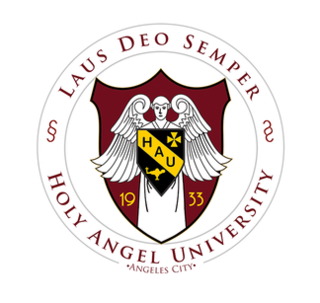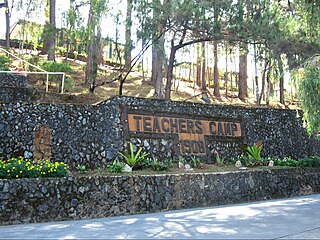
Baguio, officially the City of Baguio, is a 1st class highly urbanized city in the Cordillera Administrative Region, Philippines. It is known as the "Summer Capital of the Philippines", owing to its cool climate since the city is located approximately 4,810 feet above mean sea level, often cited as 1,540 meters in the Luzon tropical pine forests ecoregion, which also makes it conducive for the growth of mossy plants, orchids and pine trees, to which it attributes its other moniker as the "City of Pines".

The University of Santo Tomas (UST), officially the Pontifical and Royal University of Santo Tomas, Manila, is a private, Catholic research university in Manila, Philippines. Founded on April 28, 1611, by Spanish friar Miguel de Benavides, third Archbishop of Manila, it has the oldest extant university charter in Asia and is one of the world's largest Catholic universities in terms of enrollment found on one campus. It is the main campus of the University of Santo Tomas System that is run by the Order of Preachers.

Eric Oteyza de Guia, better known as Kidlat Tahimik, is a film director, writer and actor whose films are commonly associated with the Third Cinema movement through their critiques of neocolonialism. For his contributions to the development of Philippine independent cinema, he was recognized in 2018 as a National Artist of the Philippines for Film - a conferment which represents the Philippine state's highest recognition for artists.

Loakan Airport serves the general area of Baguio, Philippines. It is classified as a Class 2 principal airport by the Civil Aviation Authority of the Philippines (CAAP). Loakan Airport, the city's only airport, was built in 1934. Its short runway, frequent low visibility, and deep ravines at both ends of the runway continue to challenge pilots greatly, especially when it comes to landing.

Holy Angel University is a private Catholic research university in Angeles City, Philippines. Founded in June 1933 by Don Juan Nepomuceno and Fr. Pedro Paulo Santos, who was later named as the Archbishop of Cáceres, is considered the first lay-founded Catholic school as well as the first co-educational Catholic high school. With a student population of over 21,000, it is the largest private institute of education with the largest student population in a single campus in Central Luzon.

Burnham Park, officially known as the Burnham Park Reservation, is a historic urban park located in downtown Baguio, Philippines. It was designed by eponymous American architect and Baguio city planner, Daniel Burnham.
The University of the Cordilleras, formerly known as the Baguio Colleges Foundation (BCF), is a private coeducational university in Baguio, Philippines. Founded by Benjamin R. Salvosa and his wife Evangelina D. Salvosa in 1946, it offers programs at the elementary, secondary, undergraduate and graduate levels catering to around 21,000 students.

SM City Baguio is the 23rd largest shopping mall in the Philippines. At a floor area of 176,073 m2 (1,895,230 sq ft), it is the largest shopping mall in the North Luzon Region. The entire SM City Baguio complex stands on a land area of 80,000 m2 (860,000 sq ft) on Luneta Hill on top of Session Road overlooking historic Burnham Park and opposite Baguio's City Hall which is situated on a northern hill.

National Museum of the Philippines – Cebu is a museum in Cebu City, Philippines under the National Museum of the Philippines system.

The University of Cebu (UC) is a private, non-sectarian, coeducational basic and higher education institution in Cebu City, Philippines. It was founded in 1964 offering preschool, grade school, junior & senior high school, undergraduate degrees, and post-graduate degrees. It currently has five campuses.

The University of Baguio, formerly Baguio Technical and Commercial Institute, is a private, Filipino, multidisciplinary, autonomous university in Baguio, Philippines. It was founded by Fernando Gonzaga Bautista and Rosa Castillo Bautista on August 8, 1948, with 80 students. The student population in 2018 was about 18,000 in its tertiary level.

William Edward Parsons was an architect and city planner known for his works in the Philippines during the early period of American colonization in the country. As the consulting architect to the Philippine government from 1905 to 1914, he designed various structures throughout the country, most notably the Gabaldon school building plans.

The Baguio City Heritage Hill and Nature Park is an abandoned structure atop Dominican Hill, Baguio, Philippines. The local government initiated rehabilitation efforts, which was started in April 2022, through a 15 million Philippine pesos grant from the National Commission for Culture and the Arts. The whole property on which it stands has been renamed as the Dominican Heritage Hill and Nature Park. A panoramic view of the city unfolds from its vantage point, the stone crucifix on the outdoor patio of the hotel's second floor.

The Baguio Teachers' Camp (BTC), sometimes referred as Teacher's Camp is a teachers' training center and events venue located along Leonard Wood Road in Baguio, Philippines. It is a recognized heritage site by the Baguio city government since 2005 and the national government since 2008.
Baguio General Hospital and Medical Center (BGHMC), also known as Baguio General Hospital (BGH), is a hospital in Baguio, Philippines. It is the largest government funded tertiary hospital in the Northern Luzon Region.

Benjamin "Benjie" Bañez Magalong is a Filipino politician and retired police officer serving as the mayor of Baguio since 2019. Before entering politics, he served in the Philippine Constabulary and Philippine National Police (PNP) for 38 years. He was the chief of the Cordillera regional police office, the Criminal Investigation and Detection Group (CIDG), and the Directorate for Investigation and Detective Management (DIDM). He retired with the rank of Police Deputy Director General as the PNP's Deputy Chief for Operations.

The COVID-19 pandemic in the Cordillera Administrative Region is part of the worldwide pandemic of coronavirus disease 2019 caused by severe acute respiratory syndrome coronavirus 2. The virus reached the Cordillera Administrative Region on March 20, 2020, when the first case of the disease was confirmed to involve a resident of Manabo, Abra. All provinces, as well as the independent city of Baguio has recorded at least one confirmed COVID-19 case.

The Pamintuan Mansion is a historic building in Angeles City, Philippines built by the Pamintuan family in the 1880s. It was briefly used by the Katipunan during the Philippine-American War. It currently hosts a social science museum.

The Museo ning Angeles is a museum in Angeles City, Philippines. It is run by the Kuliat Foundation.




















